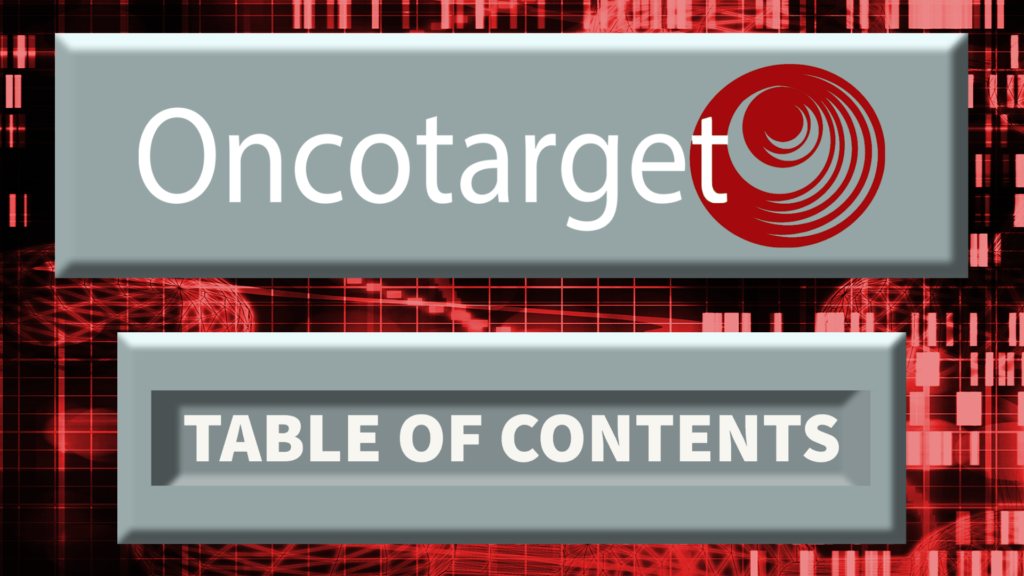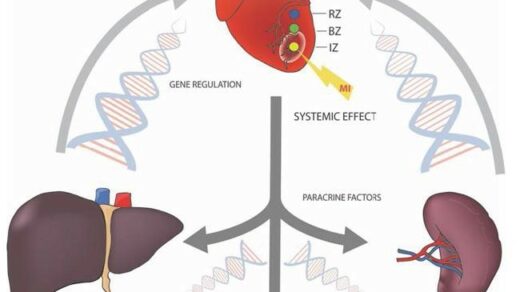Read short summaries of the latest oncology-focused research published in this week’s issue of Oncotarget: Volume 12, Issue 26.

Oncotarget’s Volume 12, Issue 26
New Publications
Cover (Research Paper): Comparative transcriptome analysis between patient and endometrial cancer cell lines to determine common signaling pathways and markers linked to cancer progression
Origin: Maryland, United States
Institutions: Uniformed Services University of the Health Sciences, National Institutes of Health
Quote: “The rising incidence and mortality of endometrial cancer (EC) in the United States calls for an improved understanding of the disease’s progression. Current methodologies for diagnosis and treatment rely on the use of cell lines as models for tumor biology. However, due to inherent heterogeneity and differential growing environments between cell lines and tumors, these comparative studies have found little parallels in molecular signatures.”
Research Paper: RASAL2 suppresses the proliferative and invasive ability of PC3 prostate cancer cells
Origin: Washington D.C., United States
Institution: Howard University
Quote: “The RAS protein activator like 2 (RASAL2) negatively regulates RAS proto-oncogene which is activated by high mutation rate in cancer. Thus, RASAL2 expression could potentially limit the function of RAS in prostate cancer (PCa). Genome-wide DNA methylation analysis demonstrated that RASAL2 is differentially hypermethylated in PCa tissues compared to benign prostate tissues.”
Review: The clinician’s perspective on the 21-gene assay in early breast cancer
Origin: Rome, Italy
Institution: University La Sapienza
Quote: “Most patients with early HR+ and HER2- breast cancer receive a hormone therapy; the clinical question still open is how to identify patients who can really benefit from adjuvant chemotherapy.”
Review: Using drug scheduling to manage adverse events associated with hedgehog pathway inhibitors for basal cell carcinoma
Origin: Manchester, United Kingdom; Zurich, Switzerland; St Leonards, Sydney, Australia
Institutions: University of Manchester, University of Zurich, Royal North Shore Hospital, The University of Sydney
Quote: “Basal cell carcinoma (BCC) is the most common malignancy and form of skin cancer worldwide; advanced BCC, either as locally advanced BCC (laBCC) or metastatic BCC (mBCC), can cause substantial tissue invasion and morbidity. Until the recent availability of the hedgehog pathway inhibitors (HHIs) sonidegib and vismodegib, treatment options for advanced BCC were limited.”
Commentary: BRCA Role Changes with Association: Tissue-specific impact on the prognosis
Origin: Bangalore, India
Institution: Indian Institute of Science
Quote: “The tumor suppressor BRCA (BReast CAncer) genes are majorly involved in biological processes such as DNA damage response, gene transcription regulation, cell cycle, and apoptosis. It was identified in the early 90s that germ line mutations in BRCA1 increase the risk of breast and ovarian cancer [1]. Subsequently, several studies in breast cancer patients found an association of BRCA1 expression levels and mutation status with the patient survival.”
Editorial: Control of the Mdm2-p53 signal loop by β-arrestin 2: the ins and outs
Origin: Paris, France
Institution: Université de Paris
Quote: “Mdm2 is a major cellular inhibitor of p53. Small molecules designed to block the Mdm2-p53 interaction have been developed as an approach for the treatment of cancer with wild-type p53 [1]. In light of this therapeutic interest continued study of mechanisms that control the Mdm2-p53 signal loop is therefore of central importance.”
Click here to read Oncotarget’s Volume 12, Issue 26.
ONCOTARGET VIDEOS: YouTube | LabTube | Oncotarget.com
—
Oncotarget is a unique platform designed to house scientific studies in a journal format that is available for anyone to read without a paywall making access more difficult. This means information that has the potential to benefit our societies from the inside out can be shared with friends, neighbors, colleagues, and other researchers, far and wide.
For media inquiries, please contact media@impactjournals.com.




